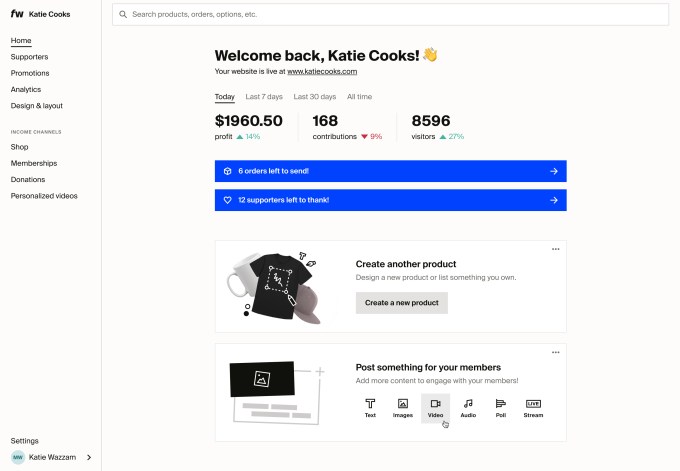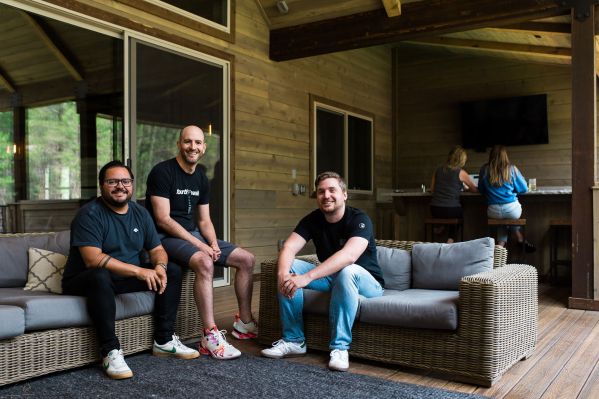Let’s say you’re a YouTube star — honestly, it’s not impossible, given that now, some estimate that over 20,000 YouTubers have at least 1 million subscribers. You’re going to monetize through YouTube ads, probably, but you might also sell merch, run a Patreon membership or write a subscription-only newsletter. More and more startups like Fourthwall are emerging to help creators consolidate their various income streams within one all-in-one creator platform, aiming to take away some of the backend administrative stress of running your own business. The goal is to give creators more time to focus on creating.
Fourthwall announced today that it raised $17 million from investors including Lightspeed Venture Partners, Initialized Capital and Alexis Ohanian’s Seven Seven Six. Like Memberful, a subsidiary of Patreon, Fourthwall offers a white-label website with built-in tools for setting up merch stores, membership programs, tipping and more. When fans buy something, there’s an integrated Cameo-like feature that lets creators send personalized video and audio messages as a thank you. Fourthwall partners with manufacturers to offer more than 200 different types of products that creators can develop to sell through their website, which creators can control down to the code itself.
“We genuinely think Fourthwall is ready to really materially help creators succeed in this area, so they’re able to focus more thoroughly on the content and community side,” CEO and co-founder Will Baumann told TechCrunch.
Still, creators are often skeptical of all-in-one solutions. Especially when the future of any given startup can look so uncertain, creators are encouraged to diversify their income streams. We saw this most recently with the almost-ban of adult content on OnlyFans — if the ban was enacted, creators would have had to start from zero, since they wouldn’t have had any way to contact their existing subscriber list (some platforms like Substack and Patreon give creators access at the get-go to their subscribers’ emails). Even among safe-for-work creators, what happens if a microinfluencer gets locked out of their Instagram account? Even acquisitions like Google’s purchase of YouTube or Spotify’s absorption of Anchor and Gimlet can drastically change a creator’s payouts from those platforms.
Fourthwall told TechCrunch that it has three months of emergency operating expenses set aside to ensure that if they were to fail, they could help transition creators to other platforms. The company said it would also make its platform open source if this were to happen. Fourthwall expects to be in business for a long time, but these contingency plans are necessary for creators who are gambling their livelihoods with emerging startups.

Image Credits: Fourthwall
To onboard onto Fourthwall, creators have to request an invite.
“Nobody gets rejected. This is just sort of our gating function to make sure we’re actually getting creators in the platform, as opposed to spam entries,” Baumann said. “Fourthwall is designed for anybody that has a community and wants to connect with that community and grow that community, and hopefully, make money off of the platform as things scale up.”
There’s no fee to join Fourthwall, but the platform takes 5% of creator earnings, plus a standard credit card processing fee of 2.9% plus $0.30 on all transactions. For creators producing merchandise through Fourthwall’s manufacturers, there are additional costs involved.
In conjunction with the funding announcement, Fourthwall is also revealing its new chief creative officer, Phil DeFranco, a YouTuber with more than six million subscribers who has been making videos for over 15 years. DeFranco started out using Fourthwall about a year and a half ago and said that his merchandise revenue increased tenfold.
“Phil’s number one focus is just making sure that the types of work that we’re building and shipping to other creators like him are meeting the bar and basically are able to solve their problems,” Baumann said. “It’s really to make sure that we’re always putting our creators first. That’s our focus: creator ownership, creator brand and greater control.”
